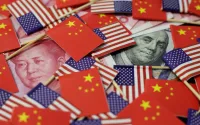An unusually broad coalition of 12 United States environmental and public-interest groups launched a national boycott on Tuesday of ExxonMobil, the world’s largest oil company, for undermining efforts to combat global warming and lobbying Congress to open the Arctic National Wildlife Refuge (ANWR) to drilling.The campaign, called Exxpose Exxon, also wants to exert pressure on the company to pay full compensation to fishermen and others harmed by the 1989 Exxon-Valdez oil spill, and to invest more money in clean and renewable sources of energy as a number of its competitors, such as BP and Shell, have done in recent years.“For years, ExxonMobil has intentionally put its own profits above a clean environment and the health of America’s families,” says a letter sent by the groups to ExxonMobil’s controversial chief, Lee Raymond. “As a result, we are asking Americans not to accept a new job at ExxonMobil, invest in the company or buy ExxonMobil’s gas and products,” stated the letter, which was signed by, among others, the leaders of Greenpeace, the Natural Resources Defence Council, the Sierra Club and Defenders of Wildlife.The campaign was launched with protests at Exxon service stations in over 50 cities across the country and organisers said they will press their protest through the Internet, news media and grassroots campaigns.Russ Roberts of Exxon’s corporate relations department said it was developing technologies to reduce the greenhouse gas emissions that most scientists believe contribute to global warming. He also denied that the company was withholding payments related to the Exxon-Valdez disaster.The campaign launch, which included the release of a 23-page report detailing the reasons for targeting ExxonMobil, comes amid growing public concern, both at home and abroad, about global warming, as well as increased support for the Kyoto Protocol, an international treaty that requires industrialised nations to reduce their greenhouse gas emissions by an average of 6% below 1990 levels by the year 2012.Nearly 75% of the American public believes Washington should ratify the protocol, according to a survey taken by the University of Maryland’s Programme on International Policy Attitudes in advance of last week’s G8 summit meeting in Scotland where President George W Bush, who has steadfastly opposed the treaty on the grounds that it would “wreck the US economy”, once again found himself isolated on the issue from the leaders of Western Europe, Japan, Canada and even Russia.The survey also found that two-thirds of self-described Republicans have said they support the pending McCain-Lieberman Bill, that would require the US to meet Kyoto’s targets by 2020, even if it cost the average household $180 a year to do so.ExxonMobil’s adamant opposition to any legislation that would limit emissions, its efforts to undermine the increasingly solid scientific consensus that greenhouse emissions are a major contributor to global warming as well as its closeness to the Bush administration have long made it a choice target for environmentalists. Indeed, ExxonMobil’s efforts to cast doubt on the link between greenhouse emissions and warming have been a hallmark of Raymond’s stewardship of the company. In campaigning against Kyoto and other schemes to limit emissions, ExxonMobil has funded more than three dozen organisations and coalitions that have tried to undermine the consensus on global warming. Many recipients of Exxon’s largesse have been members of the Cooler Heads Coalition (CHC), which was founded in 1997 after the collapse — due to the desertion of automobile manufacturers and other major oil companies, such as BP, Shell and ChevronTexaco — from the Global Climate Coalition, a similar alliance created in the late 1980s when global warming first became a major public concern.Among the groups recently funded by Exxon, according to the report, are the Washington-based Competitive Enterprise Institute, which chairs the CHC, the Advancement of Sound Science Coalition, the Capital Research Centre’s Green Watch Project, the Centre for the Defense of Free Enterprise, the George Marshall Institute and the International Policy Network.One of ExxonMobil’s 2003 and 2004 recipients, the National Centre for Policy Analysis (NCPA), was the first to publicly denounce Tuesday’s boycott launch. “Contrary to environmental lobbyists’ claims, there is still a lively scientific debate concerning the extent to which human activities contribute to the earth’s current warming trend,” the group said from its Dallas headquarters. In addition to the company’s role in influencing public perceptions about the causes and risks of global warming, the boycott organisers complained about ExxonMobil’s failure to invest in renewable energy despite a record-breaking $25,3-billion in net income in 2004.Raymond has argued that it makes more sense to invest in technologies that make energy use more efficient than in those whose economic return remains uncertain. In a journal article, he noted that Exxon invested relatively heavily in renewable energy sources in the late 1970s but that none of them turned out to be “economic.” -- © IPS
ExxonMobil takes heat on global warming
Canlı Yayın
Kâinatın tüm seslerine, renklerine, titreşimlerine Açık Radyo...
Ekolojiden siyasete, edebiyattan müziğe Apaçık Radyo'da haftanın öne çıkan gündemleri mail kutunuzda!
İletişim
Açık Medya Yayıncılık A.Ş.
Koltukçular Çıkmazı No 7 İç Kapı No 2
Tophane, Beyoğlu, İstanbul, TR-34425
Telefon: +90 212 343 4040
Faks: +90 212 232 3219
E-posta: [email protected]






